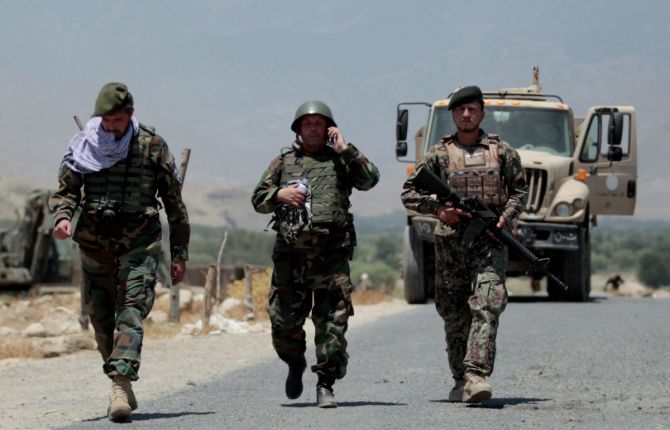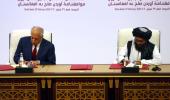'Throughout the nearly 20-year US-led war, State sponsorship from Pakistan for the Taliban has been a constant.'

"Even if the Taliban isn't getting weapons from Pakistan, it's getting other forms of Pakistani support that sustain and strengthen the insurgency."
"It's not just safe havens for leaders, but also the use of medical facilities in Pakistan for wounded soldiers. These are the types of benefits that the Taliban won't find anywhere else outside of Afghanistan," Dr Michael Kugelman, deputy director and senior associate for South Asia at the Wilson Centre in Washington DC tells Rediff.com's Archana Masih.
- Part I: 'Taliban is on the march'
What in your assessment is Pakistan's post 2010 role in fostering the Taliban? Pre-2001, it was said that Pakistan army irregulars formed the military core of the Taliban, providing direction and leadership? Do you agree?
The academic literature is unanimous on this issue: In any case of a post-World War 2 insurgency enjoying a cross-border sanctuary, that insurgency does not lose. It may not win, but it never loses.
And for an insurgency, not losing is in itself a victory, because that ensures that the government that it is fighting will always feel vulnerable and it will always feel pressure.
Pakistan's backing for the Taliban goes back many years; it was one of only three countries to recognise the Taliban regime in the 1990s.
Its deep, longstanding ties, to the Taliban made it perfectly logical that it would extend support to the group once it was removed from power in 2001 and became an insurgency.
Throughout the nearly 20-year US-led war, State sponsorship from Pakistan has been a constant.
The Taliban insurgency has been successful for many reasons -- a failed US strategy, dysfunctional and unpopular Afghan governments, Taliban alliances with powerful terror groups like al-Qaeda, ample finances, and more.
But State sponsorship from Pakistan -- as well as more modest assistance from the likes of Iran -- is another one of those fundamental reasons why an insurgency that has been hit so hard for so many years has remained so resilient and resurgent.
Does the ISI still control the Taliban? Train its fighting units? Provide armament and weapons? Surely, opium sales cannot account for the Taliban's reservoir of guns and sophisticated weapons.
Given how strong the Taliban is now, it doesn't need this type of military support from Pakistan. It has been able to acquire all types of sophisticated and heavy weaponry in recent years by seizing the armaments of the Afghan military.
In recent weeks, surrendering troops have also surrendered their weaponry.
But even if the Taliban isn't getting weapons from Pakistan, it's getting other forms of Pakistani support that sustain and strengthen the insurgency.
It's not just safe havens for leaders, but also the use of medical facilities in Pakistan for wounded soldiers. These are the types of benefits that the Taliban won't find anywhere else outside of Afghanistan.
Has the Taliban really changed? Or is it still what many observers describe it as a force of barbarians who will impose a Pakhtun version of the sharia on their country, force women into pre-2001 conditions?
One can identify some superficial indications of change: The current Taliban generation uses cell phones, it's happy to speak to female journalists, it's willing to participate in talks with female negotiators, and it's adept with social media.
But we shouldn't mistake such indications for some type of substantive transformation for the better.
The Taliban continues to be brutal and to use the same types of draconian tactics of justice and governance (in areas that it controls) that it did when it was in power in the 1990s.

How different is Hibatullah Akhundzada, the current leader of the Taliban from Mullah Omar, considering he has never fought a battle and is a cleric?
Does he have Mullah Omar's absolute authority to ensure that Taliban cadres do not indulge in carnage?
Or is he a stop-gap leader who will make way for Mullah Omar's son who is in charge of the Taliban's military wing?
No Taliban leader has come close to Mullah Omar in terms of winning over the allegiances of the entire Taliban organisation and commanding loyalty from all.
Mullah Omar had a certain mystique to him that made him into a cult of personality of sorts. His successor, Mullah Mansoor, didn't have that -- though the fact that he was killed so soon after taking over didn't give him enough time to try to acquire those qualities.
Mullah Akhundzada's arrival in power exposed some of the internal divides within the Taliban.
There were powerful factions that didn't want him to become supreme leader. It does appear, however, that Akhundzada has solidified his hold on power -- and everything is easier when the organisation performs so well, as it is on the battlefield right now.
If the Taliban were struggling, which it most certainly is not, Akhundzada would have found himself under more pressure.
That said, if the Taliban were to overthrow the government, this could bring out more internal tensions, as the group would need to figure out how to allocate power to different Taliban leaders.
What changes do you see in Afghanistan by this time next year?
The main one is that the Taliban will likely control some cities. The US withdrawal means that American air power will be removed from the battlefield equation, and this will change the entire calculus of the war.
US air power has long been used to help Afghan ground forces repel Taliban fighters advancing into cities.
This helps explain why the Taliban has rarely captured urban areas, and when it has -- such as when it briefly took the city of Kunduz twice in recent years -- its fighters have been quickly pushed out.
But now, the Afghan air force will be left with this responsibility, and while it's come a very long way since the 1990s, it will be hard pressed to replace NATO airpower.
So I envision a series of provincial capitals falling to the Taliban. If the Taliban starts taking cities, a long-time battlefield stalemate -- one where the Taliban holds sway in rural areas and the government controls cities -- will crumble.
Feature Presentation: Aslam Hunani/Rediff.com










